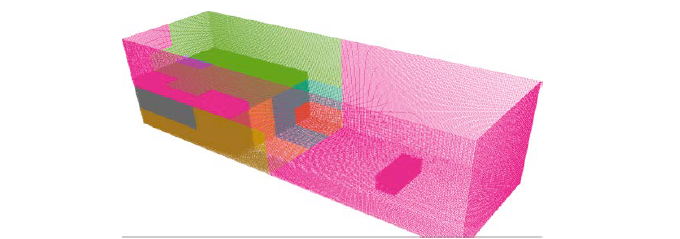Developing highly scalable 3-D Incompressible Smoothed Particle Hydrodynamics
eCSE001-003Key Personnel
PI/Co-I: Dr. Benedict Rogers, Prof. Peter Standsby - University of Manchester; Dr. Mike Ashworth - Science and Technology Facilities Council Daresbury Laboratory
Technical: Dr. Xiaohu Guo - Science and Technology Facilities Council Daresbury Laboratory
Relevant Documents
eCSE Technical Report: Developing highly scalable 3-D incompressible SPH
Project summary
Smoothed Particle Hydrodynamics (SPH) is a novel computational technique that is fast becoming a popular methodology to tackle industrial problems with violent flows. Recently, accurate incompressible SPH (ISPH) codes have become more popular now that the numerical stability can be ensured, particularly for free-surface flows. This eCSE project was funded to develop a scalable, 3-D ISPH engineering toolkit.
The ISPH software package developed in this project will be a valuable tool for the research of many problems in engineering involving both fluid-structure interaction and multi-phase fluid simulations. It will allow researchers to run large ISPH simulations (100+ million particles in 3-D) for the first time. This will enable simulations of sufficient resolution to be used to investigate phenomena and applications requiring noise-free pressure fields in SPH. In the long term, the main industrial beneficiaries from this project will be the emerging offshore wind and marine energy industries, the existing offshore oil and gas industries, and coastal engineering consultancies involved in the design of coastal defences.

Summary of the software
The ISPH software packages use git to manage software revision control. The ISPH software development repositories (including 2-D and 3-D) are currently held at bitbucket (https://bitbucket.org/isph).
Once granted access permission, the ARCHER users can easily use git to check out the master branch. We have created a wiki page for the ISPH project about how to build and contribute to the ISPH software packages.
The code has been benchmarked on the UK National Supercomputing Platform ARCHER with more than 10,000 cores. This is one of the first ISPH codes in the world that can scale to more than 10,000 cores.






